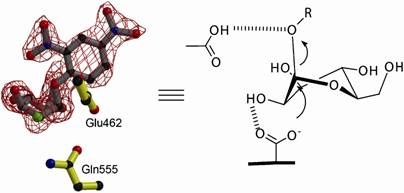New Method to synthesize Menthol
A special catalyst enables a “dream reaction”
Advertisement
menthol and cannabinoids are important for the chemical industry. A team led by Prof. Benjamin List has now found a new way to synthesize both substances - cheaper and more efficient than before.

Symbolic image
Computer-generated image
Our toothpaste contains it, you can find it in cold remedies, and it makes our chewing gum tasty: Menthol is a substance that exists naturally in various mint plants. Since hundreds of years, humans have recognized it as useful, causing an immense demand for menthol worldwide. Moreover, extraction from the plants itself is very costly. That is why each year thousands of tons of menthol are being produced synthetically.
Benjamin List, director at the Max-Planck-Institut für Kohlenforschung in Mülheim, and his team have now succeeded in simplifying the synthetic production of menthol - making it cheaper and more sustainable. The same methodology can, by the way, be used to produce cannabinoids, also sought-after ingredients due to their medical applications. The Mülheim scientists have now published their results with Nature.
A special catalyst enables a “dream reaction”
For many years, chemists had a “dream reaction” which depicted a significant shortcut in the synthesis of menthol or cannabinoids. Specifically, it involves the selective conversion of neral to a particular molecule called isopiperitenol. "For a long time, however, this particular reaction was considered impossible because the product was more reactive to the catalyst than the starting materials," explains Joyce Grimm. She is a doctoral student in the List group and responsible for this project. More than 100 years ago, chemists Albert Verley and Friedrich Wilhelm Semmler already had tried that reaction – unsuccessfully. Ben List, Joyce Grimm and their colleagues have now succeeded.
What makes their approach so special: For their method, the Mülheim researchers use a certain confined acid as catalyst, as their "molecular tool." This asymmetric, strong acid helps to form the desired product with a high degree of efficiency and selectivity. The catalyst binds the product in an "inert" form so that no further, undesired side reaction can take place.
Using the same method, the Mülheim researchers have also succeeded in demonstrating how isopiperitenol can easily be converted into cannabinoids or menthol - in the shortest and most efficient way. This, again, is of great interest to the chemical industry because processes are shortened and chemical waste is avoided.
Original publication
Other news from the department science
Most read news
More news from our other portals
See the theme worlds for related content
Topic world Synthesis
Chemical synthesis is at the heart of modern chemistry and enables the targeted production of molecules with specific properties. By combining starting materials in defined reaction conditions, chemists can create a wide range of compounds, from simple molecules to complex active ingredients.

Topic world Synthesis
Chemical synthesis is at the heart of modern chemistry and enables the targeted production of molecules with specific properties. By combining starting materials in defined reaction conditions, chemists can create a wide range of compounds, from simple molecules to complex active ingredients.






























































